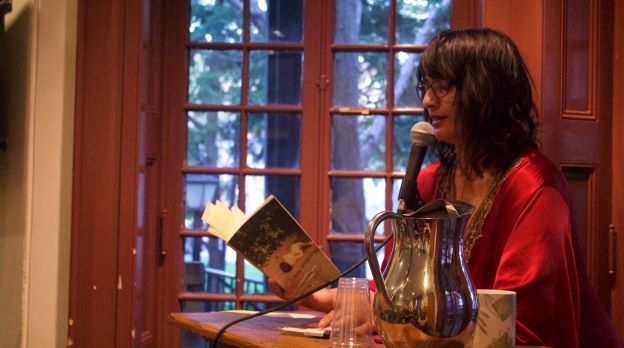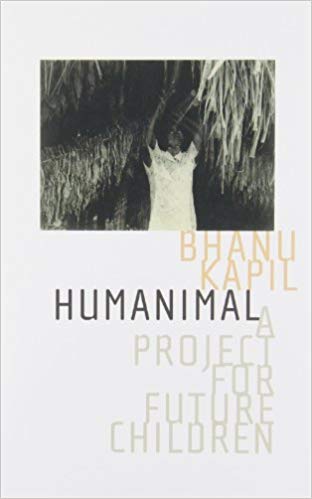On feminist poetics and pedagogy
Meeting Bhanu Kapil

The first thing I want to say to you who are students, is that you cannot afford to think of being here to receive an education: you will do much better to think of being here to claim one … The difference is that between acting and being acted-upon, and for women it can literally mean the difference between life and death. — Adrienne Rich, “Claiming an Education”
***
I’m very excited to be here with Andrea Quaid and everyone today for collective conversations on feminist poetics and pedagogy. Like to many people, the two may not seem like conjoined subjects. I also admit I don’t purport to know much about the intersections of the two. I’ve explored both separately — pedagogy in the classroom, the jail, the digital space; poetry on the page, the classroom, in jars … I’m excited either way for an exploration of both poetry and pedagogy, two passions that should intersect for me. Upon conversations with Andrea over the years, we’ve been keen to understand that as feminists engaged with poetics, our interests and work in pedagogy have often not had a space for the two to intersect. Yet, as the quote from feminist poet Adrienne Rich explains to graduating women, education is a privilege and must be claimed. Why should feminist poets reclaim pedagogy as our own? In the symposium we’re hoping for a space that can facilitate this conversation. What does poetics offer pedagogy, and how it can facilitate the difference between life and death and the promise of education?
I began with recognizing how poetry and pedagogy are often separated, even if feminist poets have always been deeply invested in questions of pedagogy. Yet then prompted, I think about a memory that taught me the embodiment of feminist poetics and pedagogy. It was a moment when a feminist poet taught me. I recall the first time I met Bhanu Kapil in person. In 2014, we were both presenting at the Asian avant-garde festival organized by Sean Labrador y Manzano at CIIS in San Francisco. Bhanu was the keynote poet, and I had been extremely excited to hear her speak after falling in love with the brilliance of her collection Humanimal: A Project for Future Children. After I presented my work, she made a point to say kind words about the poetry project. It meant so much, the weight of her words. It was a type of feminist pedagogy difficult to translate now. Because it is not language.

She was kind, generous, and luminous. She was brilliant, evoking, and beautiful. It was a presence and an exchange off the page. We had exchanged information, and a week or so later, I received in the mail a small package. A kind note, from Bhanu, to encourage my writing, and two tarot cards —one of protection, the other sunshine.
It is the kind of act that may be forgotten by the sender, but is felt ostensibly for a long long time by the receiver, which transforms the relations between mentor-mentee into a gift, a transmission, and kindness. It’s a gesture so deceptively simple yet tragically rare. An act of generosity and kindness from a feminist poet that taught me something difficult to translate into language. This gesture embodies the intersection of poetics and pedagogy. The feminist mentor providing a gesture of generosity to the emerging, and offering protection and sunshine all the same.
What prompts someone to reach out, and others to shirk or oppress? What compels someone to teach, and teach well, while others opt to cement power? How could one bestow an act of kindness in a world in which it is so rare, commodified, and shunned? Is this feminist poetics and pedagogy?
I turned to this memory to reflect on how feminist poetics and pedagogy seem to me, something not contained in books, or even manifested in the traditional workshop. In meeting Bhanu, I was taught through her act of reaching out, a model, a poetics, a grace, I still hope to embody one day. The exchange, and tarot cards. What is more feminist pedagogy and poetics than that?
*
As feminists, we are urged to think about the two feministpoeticsemergentpedagogies.com poetry and pedagogy — as a radical act. Every feminist course whether titled WGS, or WGSS, or GWS should include a unit of poetry, evoking Lorde, Rich, and Anzaldúa for all the great poetic minds who taught us feminism. Poetics is part of this equality and cannot ever be obscured.
Yet, pedagogy and poetry together seem so unfashionable. Not many books published on the topic, nor seminars, or conferences convened. Yet, we are intrigued, compelled, and pulled towards it. Could it be the mutual experience of being taught once, and taught well? Or perhaps we were not taught well. As Rich evokes, education as a liberation in which women are often relegated to not being seen as educable … And when we are placed in the role as teachers and poets, we recall the ways we’d like to change things. Perhaps that is the work of the poem, at its core, even if through osmosis, a poem teaches us something. And poets can tell us something about feminism and learning.
Today we ask a series of questions organized on how can feminist poetics intervene in conversations on pedagogy, and how we can rethink learning via feminist poetics. For the next two days, we look forward to a featured speaker’s roundtable, a panel of collaboration, and a workshop exploring these themes.
I truly look forward to the conversations and to understand further these intersections. I’m happy to introduce Andrea Quaid, who has greatly shaped my thinking on pedagogy and poetics.
May we all receive tarot cards of sunshine and protection.
*
This introduction was written for the Feminist Poetics and Emergent Pedagogies Symposium in 2018 at Bard Los Angeles, co-organized by Andrea Quaid and myself. For more information, please visit the symposium website.
Forthcoming in a compilation of talks from the symposium in Urgent Possibilities: Writings on Feminist Poetics & Emergent Pedagogies, edited by Andrea Quaid — Annex Series by eohippus labs, Los Angeles, CA, Autumn, 2019.
Automated Poetics